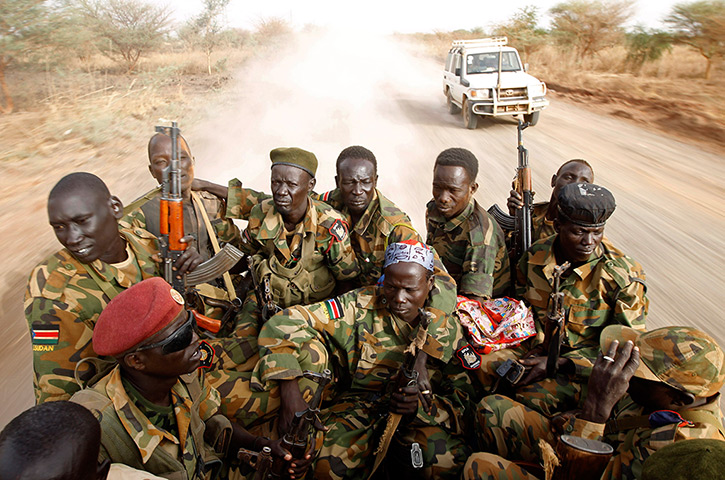Does every Sudanese peace treaty have within it the seeds of future conflict? Looking at the analysis of the events in Sudan right now, the talking heads seem to believe the incomplete nature of the Comprehensive Peace Accord of 2005 is the cause of the present conflagration .http://www.cfr.org/africa/defuse-sudan-conflict/p28072
I disagree, firstly for grammatical reasons. I am not sure how comprehensive and incomplete can be used to refer to the same object. But more to the point, this war serves as cathartic release for both presidents who are faced with daunting social and economic problems. War in this case is a distraction, a side show an attempt to externalize the enemy.
The last time a Sudanese President found himself caught between the pincers of societal change and a woeful economic situation, he set Sudan on the path to war. That president was Jaffar Nimeiry and the year was 1984. A drought had decimated the food producing regions, the Arab world was riding a wave of piety and there was very little he could do to dam the tide.
So, he gave in to the Islamists and Sharia law became the governing law over Sudan. He did put in some caveats with respect to the south but the arrow of rebellion had been loosed. The rest as they say is history. A young Colonel called John Garang was sent to put down a mutiny and somewhere along the way he decided it was easier to fight a long civil war than put down a mutiny.
The point of the foregoing is not to be fillip about things, but to bring to the fore the fact that war with the south has been the one thing the northern Arab Islamist elite have agreed upon.
The last time a Sudanese President found himself caught between the pincers of societal change and a woeful economic situation, he set Sudan on the path to war. That president was Jaffar Nimeiry and the year was 1984. A drought had decimated the food producing regions, the Arab world was riding a wave of piety and there was very little he could do to dam the tide.
So, he gave in to the Islamists and Sharia law became the governing law over Sudan. He did put in some caveats with respect to the south but the arrow of rebellion had been loosed. The rest as they say is history. A young Colonel called John Garang was sent to put down a mutiny and somewhere along the way he decided it was easier to fight a long civil war than put down a mutiny.
The point of the foregoing is not to be fillip about things, but to bring to the fore the fact that war with the south has been the one thing the northern Arab Islamist elite have agreed upon.
Bashir and Nimeiry share similar circumstances, Sudan has not been immune to the winds of the Arab spring, with its dual heritage, not quite Arab not quite African and yet fully human, the aspirations of the human heart for a more egalitarian society cannot be stilled. Egypt, Tunisia and indeed Libya have shown the weakness of a system kept in power by force and patronage in the face of people power. Sudan's Bashir is on increasingly shaky ground.
In Africa, the key use of government revenue is oiling the patronage system. For Bashir's Sudan, the loss of oil revenue which accounted for as much as 75% of government revenue has had the net effect of opening up the schisms within the National Congress Party (NCP). With much less money to go around the internal jockeying for position has intensified.
Quite apart from oiling the system, a small portion of government revenue goes toward the basic functions of government. In most African states government consumption is a large part of the economy, with reduced government expenditure and consumption the knock on effects across the economy cannot be ignored. http://siteresources.worldbank.org/INTSUDAN/Resources/Sudan_Economic_Brief-Dec_2011.pdf
Closer to home. Salva Kiir is probably feeling the post secession post independence strain. In his book Anthills of the Savannah Chinua Achebe captured the angst of post independence leaders. That moment in time when the enormity of the task at hand and the paucity of their skill set meet with a resounding clash.


The post Independence euphoria is like an opiate slowly wearing off, being replaced by the pain of a non existent state infrastructure expected to deliver without the benefit of a learning curve. No roads, no schools, no hospitals, no civil service and the weight of the aspirations of nine million people. It must be hot under that signature stetson.
Bashir and Kiir find themselves strangely united in the need for war, the one thing they were both fairly good at. War serves as a diversion, it allows both sides a common external enemy they can both focus on, blame and harangue for their failures.
Enter Uganda the regional enforcer, the Kony bogeyman serves Juba more than it serves Khartoum. Why would Bashir provide a rallying point for Juba and Kampala? The different messages being sent out by the Chief of Defense forces and the Minister of Defense in the issue of Sudan may be seen as Uganda hedging its bets, I say stay out of the game altogether. This fray will have no winners, this fray will be long and drawn out because neither party has what it takes to deliver a killing blow.
As a country we have no vital interests to protect, at least none that can be protected through the deployment of forces in Sudan. Our best bet is do what we can to make sure Southern Sudan survives as a state, short of committing blood and boots.
Bashir and Kiir find themselves strangely united in the need for war, the one thing they were both fairly good at. War serves as a diversion, it allows both sides a common external enemy they can both focus on, blame and harangue for their failures.
Enter Uganda the regional enforcer, the Kony bogeyman serves Juba more than it serves Khartoum. Why would Bashir provide a rallying point for Juba and Kampala? The different messages being sent out by the Chief of Defense forces and the Minister of Defense in the issue of Sudan may be seen as Uganda hedging its bets, I say stay out of the game altogether. This fray will have no winners, this fray will be long and drawn out because neither party has what it takes to deliver a killing blow.
As a country we have no vital interests to protect, at least none that can be protected through the deployment of forces in Sudan. Our best bet is do what we can to make sure Southern Sudan survives as a state, short of committing blood and boots.
